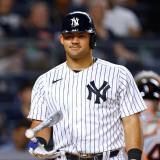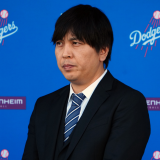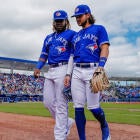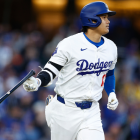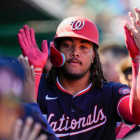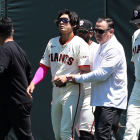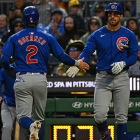Moreso than at any other point in baseball history, young players are coming up from the minors and having an immediate impact. Players are insanely talented and athletic, and teams are better at player development than ever, smoothing the learning curve. Not every rookie hits the ground running, of course, but the adjustment period is getting shorter and shorter.
The Rookie of the Year is one of MLB's most prestigious awards even though it doesn't always translate to long-term greatness. Sometimes players get hurt and are unable to build on their rookie success (like Andrew Bailey) and sometimes players struggle to adjust once the league figures them out (like Chris Coghlan). Once a Rookie of the Year though, always a Rookie of the Year.
Second-year players have no dedicated award and in some cases, they can be tossed aside for the shiny new toys that make up the next year's rookie class. Those second-year players are important though. They're making the jump from fun rookie exceeding expectations to trusted contributor. They're expected to produce. Expected to get better, really, even if that's not always fair.
With that in mind, let's create an award for second-year standouts, the Sophomores of the Year. These are the players who avoided the so-called sophomore slump and thrived in their second MLB season. We're going to go back and name Sophomores of the Year for the last five seasons, then look ahead to the top 2020 Sophomore of the Year candidates. Come with me, won't you?
2015: Jacob deGrom, Mets and Mookie Betts, Red Sox
The 2014 Rookie of the Year awards went to deGrom and Jose Abreu. DeGrom was even better as a sophomore -- he had a 2.54 ERA in 191 innings and finished seventh in the Cy Young voting -- and is an easy call for the 2015 NL Sophomore of the Year award. Abreu had a historic rookie season but was merely very good as a second year player, hitting .290/.347/.502 with 30 home runs at first base. Betts, meanwhile, authored a .291/.341/.479 batting line with 18 homers and elite defense that added up to 6.1 WAR and MVP votes. He did not receive a single Rookie of the Year vote in 2014, mostly because he debuted in late June and played only 52 games. Two present day greats are our 2015 Sophomores of the Year.
2016: Kris Bryant, Cubs and Carlos Correa, Astros
Again an easy call on the National League side. Bryant was the unanimous Rookie of the Year in 2015 and one vote short of being the unanimous MVP in 2016. He hit .292/.385/.554 with 39 homers and led the league with 7.3 WAR as a second year player. The 2015 Rookie of the Year race was much closer on the AL side. Correa and Francisco Lindor were neck and neck, with Correa winning the award by four votes. Those two again battled for our Sophomore of the Year award in 2016, but the race was much more one-sided. Correa beat Lindor in basically every meaningful category (on-base percentage, slugging percentage, homers, WAR, etc.) that year, so he gets the award. Aaron Sanchez deserves a mention here. He threw 192 innings with a 3.00 ERA and finished seventh in the Cy Young voting as a sophomore in 2016.
2017: Corey Seager, Dodgers and Gary Sanchez, Yankees
I'm starting to notice a pattern. Once again, our NL Sophomore of the Year is the previous year's Rookie of the Year. Seager was the unanimous Rookie of the Year and I reckon he would've been the unanimous Sophomore of the Year after hitting .295/.375/.479 with 22 homers as a shortstop. Trea Turner would've been the runner-up here. On the AL side, Sanchez finished second to Michael Fulmer in the 2016 Rookie of the Year voting, mostly because he wasn't called up until August. He hit 33 homers as a second-year player in 2017, the most by a catcher since Javy Lopez hit 43 in 2003, and he was an All-Star with a .278/.345/.531 batting line. Alex Bregman, who received zero Rookie of the Year votes following a late call-up in 2016, would've given Sanchez a run for his money for the Sophomore of the Year award. He hit .284/.352/.475 with 19 homers and a great glove.
2018: Kyle Freeland, Rockies and Matt Chapman, Athletics
At last, an NL Sophomore of the Year who wasn't the previous year's Rookie of the Year. Cody Bellinger won the 2017 award with an NL rookie record 39 homers. He slipped a little bit as a second-year player while Freeland had maybe the greatest season by a Rockies pitcher in 2018, throwing 202 1/3 innings with a 2.85 ERA. (At 8.2 WAR, it is the best season ever by a Rockies pitcher.) Aaron Judge obliterated rookie records in 2017 but was limited to 112 games by a broken wrist in 2018, allowing Chapman to slide in and take home Sophomore of the Year honors. He hit .278/.356/.508 with 24 homers and all-world defense at the hot corner, and finished third in the Junior Circuit with 8.3 WAR. Ozzie Albies and Mitch Haniger would've been the runners-up.
2019: Jack Flaherty, Cardinals and Shane Bieber, Indians
Ronald Acuna Jr. and Juan Soto battled for the 2018 NL Rookie of the Year and neither gets our 2019 Sophomore of the Year nod. That honor goes to Flaherty, who put together a historic second half and finished with a 2.75 ERA in 196 1/3 innings. That earned him a fourth-place finish in the Cy Young voting. Flaherty and Acuna actually tied with 5.7 WAR last year, so maybe they should've been co-Sophomores of the Year? I wouldn't argue with that. Soto would've been an obvious third-place finisher with Walker Buehler and Jeff McNeil not far behind. Heck of an NL crop of the second year players in 2019. On the AL side, Bieber beats out Gleyber Torres rather decisively by WAR (4.6 to 3.1) despite not receiving any Rookie of the Year votes in 2018. Shohei Ohtani's and Miguel Andujar's injuries took a bite out of what could've been a wild AL Sophomore of the Year race.
Predicting 2020
Top NL Candidates: Pete Alonso, Mets; Zac Gallen, Diamondbacks; Keston Hiura, Brewers; Chris Paddack, Padres; Bryan Reynolds, Pirates; Mike Soroka, Braves; Fernando Tatis Jr., Padres
Alonso set a new rookie home run record last year and was one vote short of the being the unanimous Rookie of the Year. Power is fairly consistent year to year, at least moreso than ERA and batting average, so he's as good a pick to win Sophomore of the Year as any Rookie of the Year winner the last half-decade or so. I'd put my money on Tatis though. He is electric and can provide a defensive and baserunning element Alonso can not while still providing high-end offense. Gallen is the sleeper. He did not receive any Rookie of the Year votes last year but is a major breakout candidate given his strike-throwing ability and deep bat-missing arsenal. Going from zero Rookie of the Year votes one year to a top-five finish in the Cy Young voting the next is not impossible. Others to watch include Cardinals super sub Tommy Edman, Pirates shortstop Kevin Newman, Nationals center fielder Victor Robles, and Dodgers catcher Will Smith.
Top AL Candidates: Yordan Alvarez, Astros; Bo Bichette, Blue Jays; Vladimir Guerrero Jr., Blue Jays; Eloy Jimenez, White Sox; John Means, Orioles; Nick Anderson, Rays; Alex Verdugo, Red Sox
Clearly, Vlad Jr. will be the most famous sophomore in 2020, though Bichette, his infield mate, out-produced him in fewer games last year. That said, I'd bet on Vlad taking a big step forward and Bichette taking a slight step back this season. Guerrero would have to overcome his defensive and baserunning deficiencies, but the offensive potential is so great that no one should be surprised if he's in the MVP conversation come ... whenever the season ends. Jimenez is in the same boat too. His rookie year was underwhelming, though his bat is special. Verdugo challenging for the Sophomore of the Year award after getting traded over the winter would be fun, I think. Others to watch here include Blue Jays infielder Cavan Biggio, Rays infielder Brandon Lowe, Indians center fielder Oscar Mercado, and Tigers righty Spencer Turnbull.







